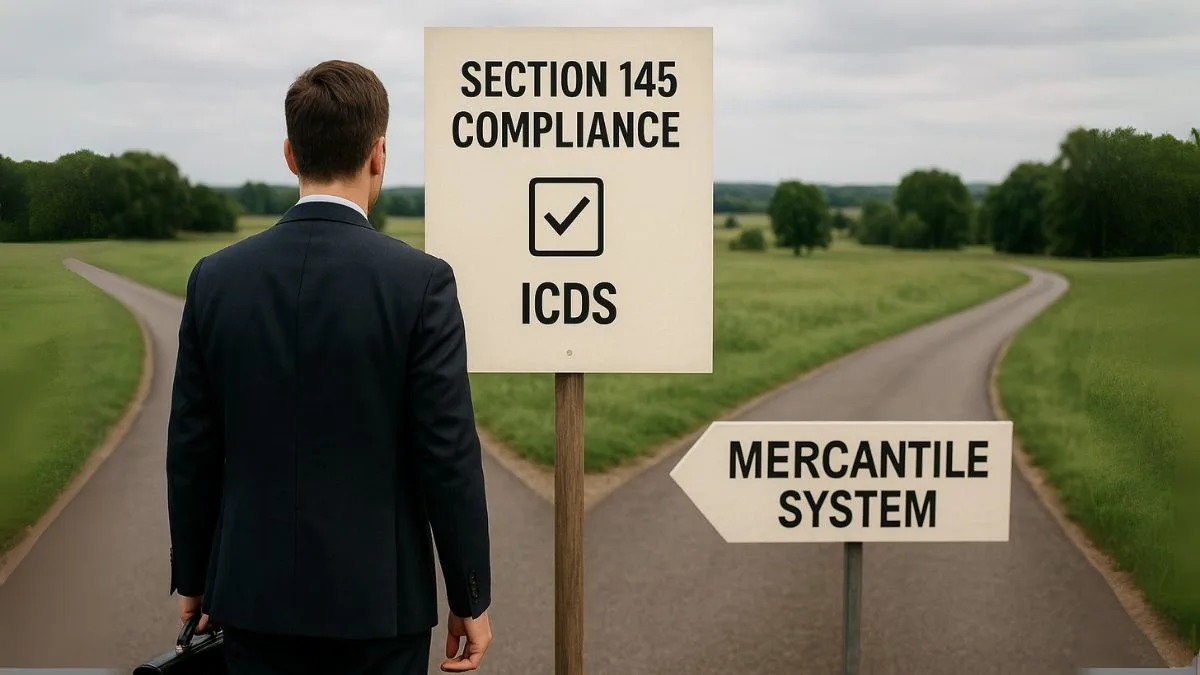
The Indian Income Tax Act, 1961, lays down several provisions that guide taxpayers on how to compute their taxable income. One such crucial provision is Section 145 of the Income Tax Act. This section deals with the method of accounting that should be followed by taxpayers to arrive at the correct computation of income under the heads "Profits & Gains of Business or Profession" & "Income from Other Sources."
Under this section, taxpayers have the flexibility to maintain their accounts either on a cash basis or mercantile basis, as long as the chosen method is consistently followed year after year. Let’s dive deeper into the details of Section 145 of the Income Tax Act, its relevance, & how it affects tax calculations.
What Does Section 145 of the Income Tax Act Provide?
Simply put, Section 145 provides the method of accounting by the individual taxpayer. The two accepted methods of accounting as per the Act are:
- Cash Basis of Accounting: Income is recognized when it is received, & expenses are recorded when they are paid.
- Mercantile Basis of Accounting: Income & expenses are recognized when they accrue, regardless of when the cash is received or paid.
Taxpayers must stick to one method consistently to ensure the accuracy & comparability of financial results."
Why Does the Method of Accounting Matter?
The method of accounting directly affects the timing of income & expense recognition, which in turn impacts the computation of taxable income. To ensure uniformity & prevent manipulation, Section 145 of the Income Tax Act mandates that the income should be computed according to either of the prescribed methods.
Furthermore, from Assessment Year 2017-18 onwards, the Income Computation & Disclosure Standards (ICDS) were notified. These standards are specifically meant to govern the computation of income & apply irrespective of the accounting standards followed for the preparation of financial statements.
Thus, the ICDS shall apply for the computation of taxable income even when a taxpayer uses either the cash or mercantile method for maintaining their books.
Key Takeaways from Section 145 of the Income Tax Act
- Taxpayers can choose between the cash system and the mercantile system of accounting.
- The method should be consistently followed every financial year.
- The Central Government has the power to notify specific accounting standards to be followed for different sectors.
- For the computation of taxable income, ICDS (Income Computation & Disclosure Standards) is mandatory, irrespective of the accounting method used.
- In case the Assessing Officer finds that the accounts are not in line with the prescribed method, he may reject the books of accounts under Section 145(3) & compute income on a best judgment basis.
Who Needs to Worry About Section 145?
The relevance of Section 145 of the Income Tax Act extends to:
- Individuals carrying out business or a profession.
- Partnership Firms.
- Companies.
- Any taxpayer with income under the head “Profits & Gains of Business or Profession” or “Income from Other Sources"."
If your income falls into any of these categories, you must ensure that you follow the correct method of accounting as per Section 145 & comply with ICDS for accurate income computation."
Practical Examples: How Section 145 Works
Let’s say you are a small business owner who maintains books on a cash basis. Under this method, you record income only when money is received & expenses only when paid. Alternatively, if you switch to a mercantile basis, you’ll need to account for income as soon as it is earned (even if not yet received) & expenses when they are incurred (even if not yet paid).
Once you select a method, you must apply it consistently. Frequent changes between cash & mercantile systems could attract scrutiny from the Income Tax Department & may lead to disputes or penalties.
Role of ICDS under Section 145
The introduction of ICDS ensures uniformity in the treatment of various accounting aspects like:
- Revenue recognition.
- Valuation of inventories.
- Borrowing costs.
Even if your accounts are prepared under traditional accounting standards, for tax purposes, ICDS shall apply for the computation of taxable income.
Final Thoughts: Stay Compliant, Stay Worry-Free
Navigating taxation can feel overwhelming, especially with sections like 145 of the Income Tax Act. Whether you’re a business owner, freelancer, or professional, choosing the right method of accounting & adhering to ICDS is crucial for accurate tax computation & compliance.
👉 Need help with choosing the right method of accounting or filing your taxes hassle-free? Our experts at Callmyca.com are just a click away to make your tax journey smooth & stress-free. Don’t let tax stress hold you back—Call My CA today!











